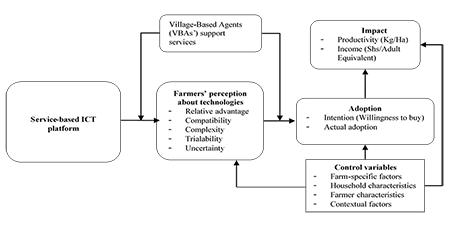African farmers are increasingly presented with innovative technologies to maximise their agricultural production potential and remain food secure. One of the innovations has been through the biological nitrogen fixation project N2Africa promoting proven legume technology packages (Improved seed varieties, phosphorus fertilisers, inoculants for improved productivity. Whereas considerable efforts have been made, adoption remains low due to limited knowledge and information on available technologies, inputs, credit and other services. The rapid growth of ICTs presents an opportunity to overcome information related deficiencies in agriculture (Nakasone et al., 2014). However, the existing ICT initiatives have tended to offer disaggregated services to address specific challenges such as; extension, inputs, market intelligence, among others, without consideration for bundled services as required by farmers who continue to face a myriad of information gaps across the value-chains. While there is evidence on the role of ICTs in information exchange, there is a knowledge gap on how a service based ICT platform enhances adoption of technologies and whether this leads to productivity and income increase for smallholders.
Methodology:
- Multiple case study on various ICT interventions and their influences on smallholders adoption.
- Field experiment to test the service-based ICT Platform on smallholder’ Adoption of legume technologies
Expected results:
- A theoretical framework on how ICT platforms can strengthen smallholders’ adoption of farming technologies.
- A service based ICT platform providing bundled services to all actors.
- Effect of ICT platforms on legume technologies adoption.
|
|
 |
Connetie Ayesiga, Wageningen University & Research, The Netherlands and IITA, Kampala, Uganda. Her research locations are two legume growing districts: Apac and Oyam in Northern Uganda. (No previous updates)


